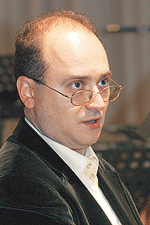> [Archived] Chronicles

From Apprenticeship to Mastership in Conducting
The Opera Hall of the Bucharest National University hosted on March 26th 2010 the awards gala of the young conductors who have participated in the From Apprenticeship to Mastership in Conducting programme. This second edition offered the thirty participants the chance to come into contact with professional musical ensembles.
Coordinated by associate proffesor and project manager Lucia Costinescu together with the Bucharest Music University rector special coordinator Ph.D. Dan Dediu, the initiative is sponsored by the European Structural Funds raising up to 250.000 euro. The students have the opportunity to practice during the summer time and to meet their tutors, namely conductors such as Horia Andreescu, Cristian Brâncuşi, Stelian Olariu or Voicu Popescu. Until now, the institutions supporting the event are the Romanian Radio Broadcasting Company, the Bucharest National Opera House and the Târgovişte, Piteşti and Ploieşti Philharmonics. At the end of the gala, Andrei Racu, the winner of the first prize at the February edition of From Apprenticeship to Mastership in Conducting conducted a chamber ensemble of the Dinu Lipatti Highschool.
On this occasion, we had a conversation with Mr. Dan Dediu, rector of the Bucharest Music University and programme coordinator.
Which are the main coordinates of this project?
This project is addressed to young orchestra and choir conductors who do not have the chance to conduct orchestras and choirs during their studies. We have tried to collaborate with concert institutions from Bucharest and other cities and establish partnerships so that these young students can get the chance to practice in philharmonics. We have discussed with the Târgovişte, Piteşti and Ploieşti Philharmonics whose directors have been very willing to provide the venues for practice and even for performing.
Secondly, we have a partnership with the Romanian Radio Broadcasting Company as well as with the National Opera House. I would like to add that this project has been made possible through the European Structural Funds and the OPHRD (Operational Programme Human Resources Development) which helped us organize several conducting events in which the best students took part.
It is also important to mention that the moment you come into real contact with the orchestra or the choir you start to understand better what you are doing. It is like the difference between theory and practice. A conductor is a practitioner and he has to apply even the first theoretical basis and to single out its particularities in context as well as to the audience. Nevertheless, he should give his best to conduct these extremely complex organisms which are the orchestra and the choir.
What do you intend to do next?
I will do the same with the next generations of students. Some of them have finished their studies and are looking for a job at the choirs and philharmonics in Romania. The younger ones have already enrolled in an MA programme. These generations harden themselves, they are 'hammered out' during this programme and we want to keep on doing this, to maintain the partnerships mentioned and perhaps even to create a syndicate of the Music National University, as we are the ones who prepare these students and not only in conducting, of course - there are also those who study music performing, canto and so on. These partnerships can only be beneficial to us as well as to the institutions which are willing to take the graduates under their wing.
Translated by Georgiana Mîndru and Valentina Tache
MA student, MTTLC, Bucharest University














